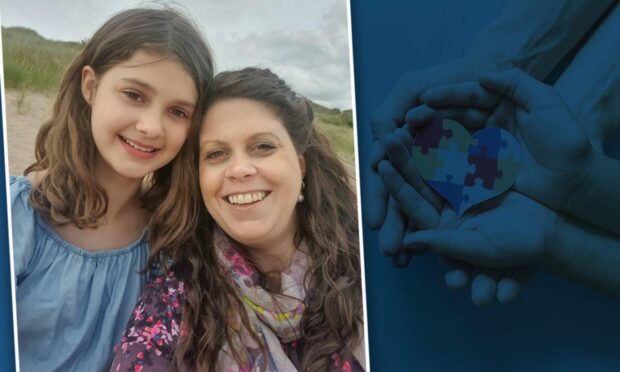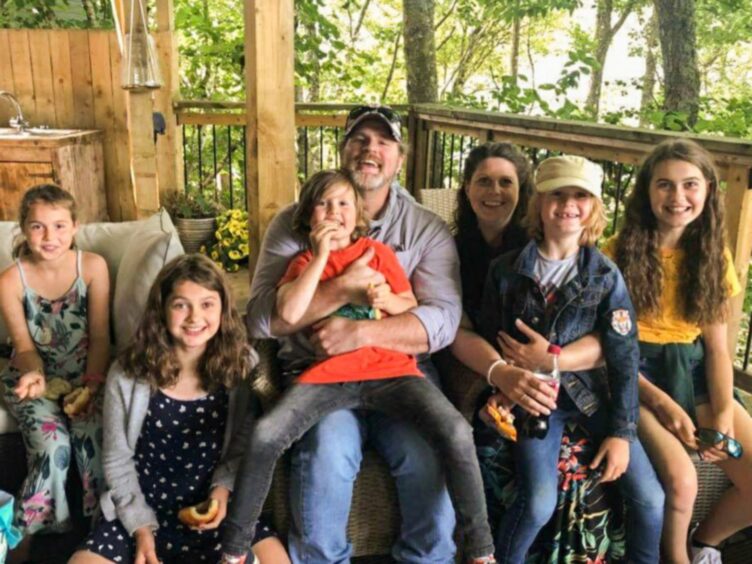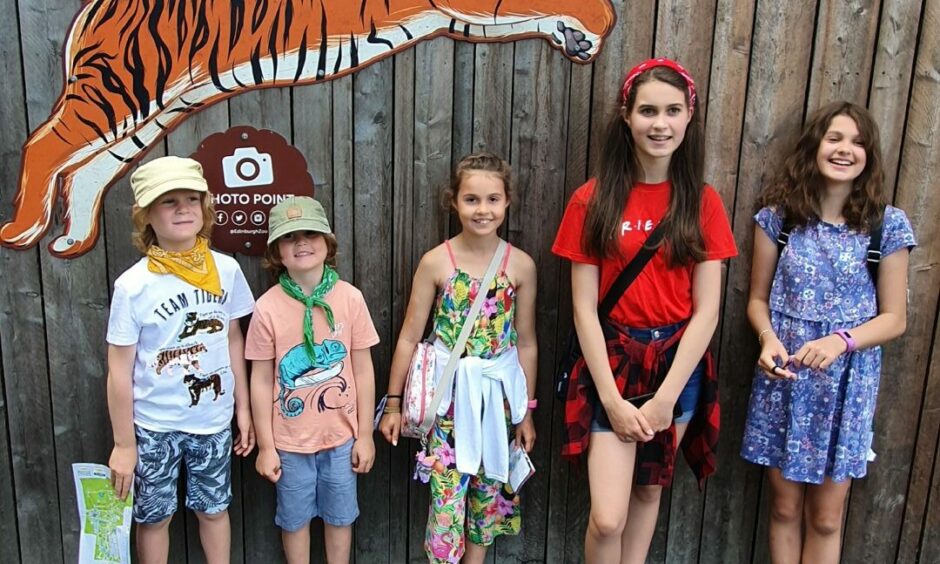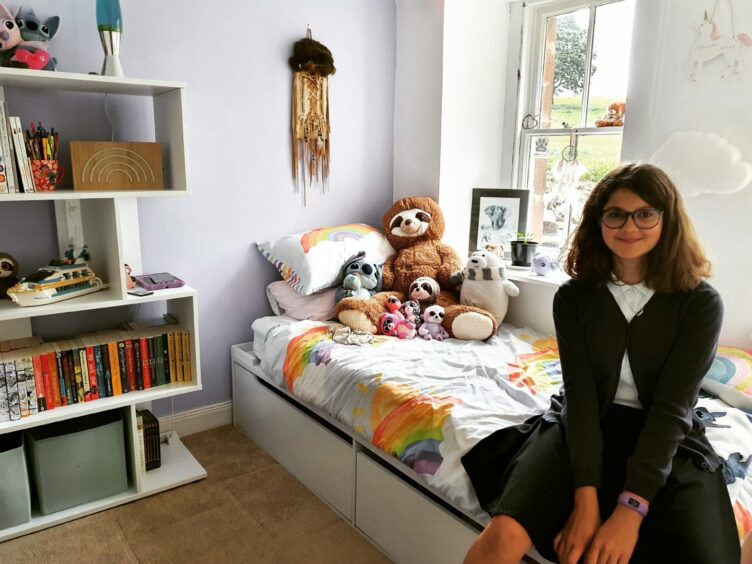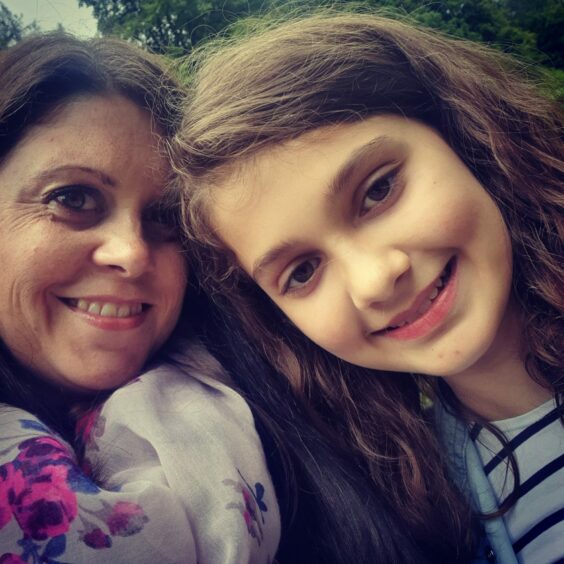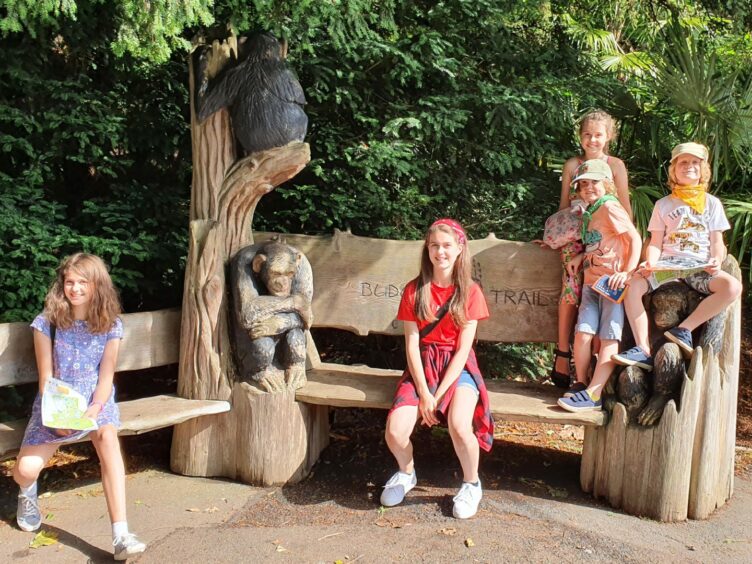When mum Tori Chamberlain received her six-year-old daughter’s diagnosis of autism she broke down in tears – of relief.
The Kirriemuir mum-of-five says she “naively” thought this would mean people would understand daughter Millie’s condition and help her get the support she needed.
Instead Tori says it has been a “fight every step of the way”, except for the invaluable support she receives from Family Fund, a national charity which supports families with children with disabilities.
Now the 44-year-old mum is sharing her story of how autism affects her child, in a way which will likely raise awareness around the condition.
Tori, mum to Rosie, 15, Millie, 12, Bea, 11, Gabriel, eight and Memphis, six, says she is fiercely proud of all her children for different reasons.
But Millie, who appears to be a “pretty and happy girl from the outside” has considerably more to deal with than most children.
Symptoms of autism can include need for routine, delayed processing of information, difficulties in communicating, overwhelming stress caused by bright lights or loud noises, and increased levels of anxiety.
‘Crazy amounts of anxiety’
Everyday activities can become major events for people with autism. In Millie’s case, any change to her usual routine causes her high levels of anxiety.
When outdoors she always carries a backpack with emergency items including ear defenders, ear plugs, sensory toys, clicking items, and soft tactile objects.
“I have to talk to her about how long we will be out, where we are going, what we will be doing, what we might encounter along the way which might delay our coming home,” said Tori.
“A small supermarket she can just about handle but a bigger one in Dundee – it would be sensory overload and too much for her.
“It takes her a few days afterwards to recover from things like that. She will have a build-up of anxiety for days before then needs a few days to come down from it.”
Millie will spend time alone in her room as a coping mechanism, closing her door as a signal for family members to give her space.
The accumulative effect
A build-up of little things that have “gone wrong” throughout the day can have a detrimental effect on Millie’s condition, leaving her feeling worn out.
For example if the school bus is late in the morning, then a teacher is off, then a change of classroom, a fire alarm and so on.
“She can manage one thing but more than that and she’s done,” said Tori. “She will ask to come home, go to her room and will only come out for dinner, if that.
There’s a physical change in her appearance.”
Tori Chamberlain
“There’s a physical change in her appearance. She becomes pale, dark rings around her eyes and she has to cocoon herself and stay in her little bubble to get through it.”
This has been particularly difficult for Tori at times, especially in the early days after Millie’s diagnosis when she would return home from primary school.
Tori said: “You could always tell what kind of day she’d had at school by the way she came off the bus.
“If she’d had a good day she would come bounding off the bus and skip down the path.
“But if she’d had a bad day she would have her head down and trudge, like she had the weight of the world on her shoulders.”
‘The signs were always there’
Tori says signs were evident in Millie long before her diagnosis of autism.
At just two-years-old Millie would repeatedly line up her books, always in rainbow order, and toys she chose to play with were sensory toys with lights or sounds, or soft toys.
Tori said: “She never slept, from when she was first born, even now, she has to have melatonin medication to get to sleep.
“She didn’t like to be put down and she cried constantly. I used to wrap her up in a blanket and if even a finger came out she would cry inconsolably.”
Being her second baby, Tori expected Millie to fit into her current routine but it quickly became evident that was not going to happen.
However Millie’s older sibling Rosie was “instrumental” in Millie receiving her diagnosis of autism at the age of six.
Tori said: “I was asked questions about what she would do at school – things I couldn’t answer like the types of games she would play or how she would react to certain situations.
It was incredibly difficult to get her diagnosed”
Tori Chamberlain
“Rosie was able to answer those and say she wouldn’t play chasing games or if it was too noisy she would go somewhere quiet.
“It was incredibly difficult to get her diagnosed but that was six years ago, things have moved on a bit since then.”
Starting high school
Even the smallest change can be distressing for those with autism, meaning a significant change such as starting secondary school can become very difficult.
Millie’s anxiety around high school began years before she was due to transition – when her older sister, Rosie, was preparing to start secondary.
Tori says she was “exceptionally worried” about Millie making the move, but worked closely with the school to arrange early visits and a reduced timetable.
She said: “We would rather she did well in a few subjects than try to do everything and get stressed out and not be able to do anything.
“When she’s got free periods she can go into the sensory room and she gets out of class early to go to the next one, so that she doesn’t have to deal with crowds.
“The teachers are all aware and have been good with her, and her friends are very understanding too.”
Tori says she is now focusing on helping Millie learn how to be an adult with autism, helping her to identify things which cause her difficulty and solutions to resolve them.
Help and support
Days out with the whole family have been integral in this learning, which Tori says would not have been possible without a Take a Break grant from Family Fund.
She said: “As a family of seven we never get a holiday break away, and I don’t think Millie would manage too long away from her space.
“So we do day trips away, which have given us the most magical experiences and memories.”
Trips include Edinburgh Zoo and the Highland Wildlife Park, both of which were during periods of restricted visitor numbers.
Further grants from Family Fund were used to purchase furniture for Millie’s room, helping her take ownership of her space.
Tori says the grants are invaluable as general life can be very expensive for families supporting children with additional needs.
